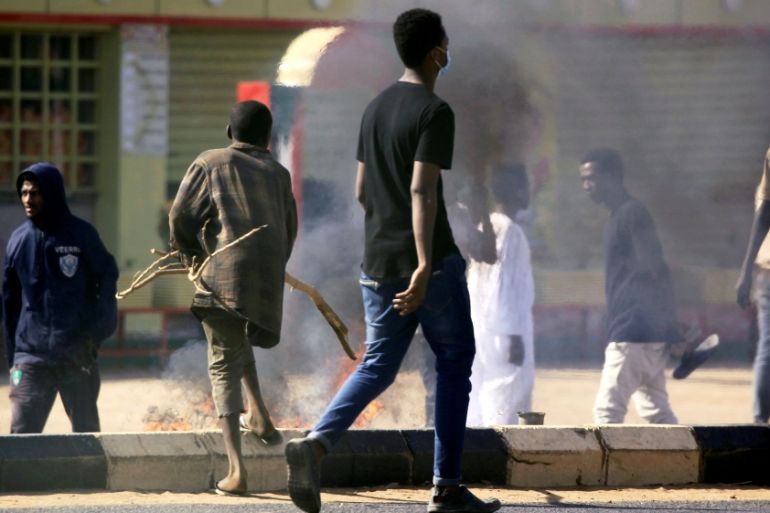Police fire tear gas as anti-government protests resume in Sudan
Demonstrators keep up ‘freedom, peace, justice’ rallying cry against the government of President Omar al-Bashir.

Crowds of protesters chanted “freedom, freedom” as riot police fired tear gas on anti-government rallies in Sudan‘s capital and its twin city of Omdurman on Monday.
Dozens of demonstrators took to the streets in two districts of Khartoum and in Omdurman, across the Nile.
Keep reading
list of 4 itemsOusted President al-Bashir in Sudan military hospital, army says
Sudan’s pro-democracy activists mark anniversary with protests
Sudan military leader urges troops to back democratic transition
Riot police swiftly moved in to disperse the protests, firing tear gas at one of the rallies in the capital, according to witnesses.
Even as police fired tear gas, protesters kept up the “freedom, peace, justice” rallying cry of an anti-government campaign that erupted in December.
Demonstrations came after campaigners called for new rallies this week against the government of President Omar al-Bashir.
Defence minister speaks
On Monday, Defence Minister Awad Ibnouf called for the inclusion of youths in dialogue.
Ibnouf did not directly address the protesters’ concerns, but said the situation in the country showed a schism between young and old.
The situation “requires inter-generational communication and fair solutions to youth problems and realising their reasonable ambition”, he said.
Recent events “showed the need to reshape political entities, parties and armed movements of the political scene with a different mindset than before”, he added during a briefing with military officers, according to a ministry statement.
The minister did not spell out what kind of reshaping should take place and there was no immediate response from opposition parties that have backed the demonstrations.
|
|
Ibnouf’s comments come days after the army’s chief of staff, General Kamal Abdelmarouf, said the army “will not allow the Sudanese state to collapse or fall into chaos” amid the ongoing protests.
Bashing Bashir
Deadly protests have rocked the African country since December after cash-strapped Khartoum cut a vital subsidy on bread.
The protests quickly escalated into anti-government demonstrations across cities and towns, with protesters calling on Bashir to step down.
Officials say 30 people have died in nationwide protests, but Human Rights Watch says at least 51 people have been killed.
Bashir has remained defiant, addressing loyalists at several rallies across the country and seeking support from regional allies.
On Sunday, he held three rallies in the state of North Kordofan where he pledged to bolster rural growth by undertaking new infrastructure projects.
Bashir and other senior Sudanese officials have repeatedly said the government can only be changed through elections.
The veteran leader, who came to power following a coup in 1989, is considering running for a third presidential term in polls due next year.
The protest campaign led by the Sudanese Professionals Association is seen as the biggest challenge yet to Bashir’s three-decade rule, with young men and women demanding his resignation in daily demonstrations.
At one of his rallies in North Kordofan on Sunday, Bashir appealed to the country’s youth to help build a new Sudan.